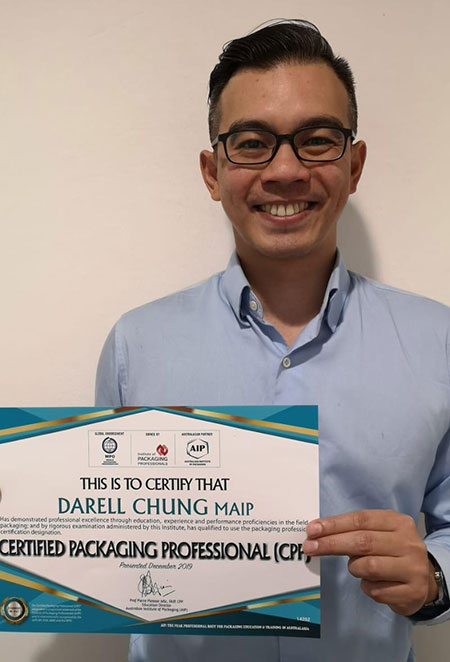 Darell Chung MAIP, Senior Executive, Marketing Food & Packaging Sales & Marketing Centre, Mitsui Chemical Asia Pacific has attained the Certified Packaging Professional (CPP) designation for the industry; making him the first Singapore CPP since the international recognition was introduced into the Australasian region. Offered exclusively through the Australian Institute of Packaging (AIP) in Australasia, the Certified Packaging Professional (CPP) designation is the leading mark of excellence internationally and a must-have recognition of industry proficiency and achievement for packaging professionals.
Darell Chung MAIP, Senior Executive, Marketing Food & Packaging Sales & Marketing Centre, Mitsui Chemical Asia Pacific has attained the Certified Packaging Professional (CPP) designation for the industry; making him the first Singapore CPP since the international recognition was introduced into the Australasian region. Offered exclusively through the Australian Institute of Packaging (AIP) in Australasia, the Certified Packaging Professional (CPP) designation is the leading mark of excellence internationally and a must-have recognition of industry proficiency and achievement for packaging professionals.
The AIP asked Darell a few questions about his career and packaging education and why the Certified Packaging Professional (CPP) designation is so important for the industry…
Q1: How long have you been in the industry? What are your areas of expertise?
I have been in the industry for 10 years and excluding my education in polymer technology, my areas of specialty mainly revolves around barrier packaging for food applications. Areas such as Tie resins, barrier resins, barrier coatings, as well as to lesser degree, resins for sealant films. Applications I have worked on include snack foods, cup fruit, meat among others. Countries I have been responsible with in my experience include ASEAN, ANZ and South Asia (excluding India) and Africa.
Q2: What made you apply for the Certified Packaging Professional (CPP) Designation?
I wanted to become a CPP for a few reasons. Personally for my own professional development, as well as to get to know more people who are within the industry. Additionally, I wanted to review the course on my company behalf, I found one of the important portions of the CPP was the resume, and keeping it relevant. This would be useful to ensure that our staff maintained updated knowledge in the packaging as well as open more avenues for them to meet with members in the packaging field.
Q3: How important is attaining the CPP designation to you as an individual?
I am really happy that I can share a path that so many respected members of the industry have taken.
Q4: What is it like knowing that you are the first CPP in Singapore?
Pretty stoked actually, I’m glad that the AIP has brought this course to the region, I have known about the CPP for several years already, however last I knew it was mainly a US thing. That did not have as much meaning in this region. Now however, this situation has started to change. Especially considering that the President of the World Packaging Organisation, PIerre Pienaar, is a CPP as well.
Q5: How does the CPP designation help someone who is either new to the industry or for someone looking to gain non-technical packaging knowledge for their role?
I would say that for someone new I would perhaps recommend the CPIT first, I think it shows someone who is committed to being involved in the Packaging field for many years to come.
For someone looking to gain non-technical packaging knowledge:
I actually feel that it can get quite technical at times. So for the non-technical person some portions might get a little tough, so start with the CPIT. Areas considering distribution, cost, giving a birds eye view of the packaging industry would however likely interest you. Hence it will still be interesting to do.
If you are for instance a polymer films specialist or a canning specialist and would like to expand your knowledge on your advantages and disadvantages vs other options, it’s definitely worth doing for sure.
Q6: What would you say to people considering taking the CPP designation?
Definitely do it. I would think the CPP designation would be a constant reminder, to keep the information that you know relevant and if possible encourage contributing back to the industry in terms of patents or creating new knowledge in the field.
Q7: How important is the CPP designation for the greater recognition of new people in to the packaging industry?
I believe that once the Industry accepts it as a standard in the region, the recognition will soar. For now I think some work together with the packaging & materials companies in the region for recognition, in exchange for ensuring staff continue their learning or better still contribute to the industry, might be a possible direction.
